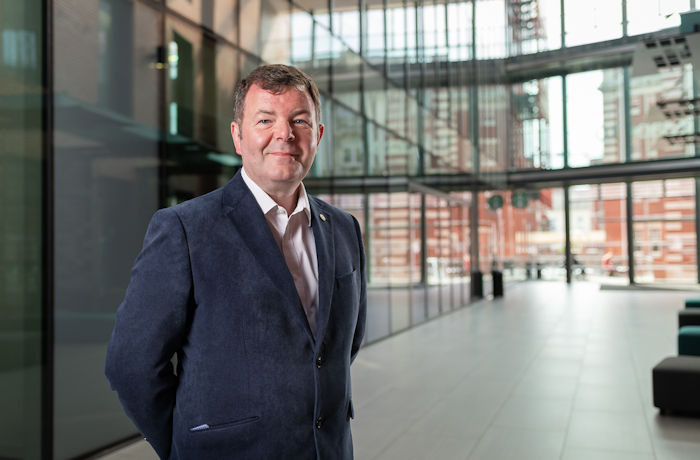
Ian Bruce: Our research response to Covid-19
Professor Ian Bruce, Director at the Manchester Biomedical Research Centre (BRC) and chair of the COVID-19 Research Rapid Response Group (RRRG) at the University, talks about his experiences since the pandemic broke.
It is hard to find superlatives to describe the past few weeks. The COVID-19 emergency is an historic event and one has to go back exactly a century to the ‘flu pandemic post World War I to see anything like this on a global scale.
In mid-March just before the national lockdown, the University closed its buildings to all but essential activities. This has profoundly affected teaching, research and social responsibility activities across the whole university. Like many, our group’s research projects, whether in set-up, mid-cycle or in the analysis phases all have been paused or delayed; in the Trust, our whole pattern of clinical work has changed.
In the middle of such a crisis, certain research activities do however need to continue. We are a world-leading university with strengths in many areas of direct relevance to COVID-19. This is a viral illness that primarily targets the respiratory tract. The multi-organ effects often result from over activation of the immune system, driving hyperinflammation and excess clotting that some patients experience as serious consequences of the infection. It is also a major global public health emergency and whilst it is described as a “great leveller”, there is no doubt that COVID-19 disproportionately affects those from our most disadvantaged communities as well as societies with underdeveloped healthcare systems.
It was therefore vital that the University responded and supported researchers to develop, plan and execute work that would have an impact on the COVID crisis. We also need to balance that against the importance of respecting physical distancing and the health and safety aspects of working at the University. As Director of the National Institute for Health Research (NIHR) Manchester Biomedical Research Centre (BRC), Graham Lord Dean of the Faculty of Biology, Medicine and Health invited me to chair a COVID-19 Research Rapid Response Group (RRRG). We agreed that we would have a clear focus to coordinate research and innovation activity to:
1) Minimise lives lost
2) Minimise the impact of this crisis on our health and care systems and on our citizens.
We also agreed to focus on work that would have an immediate early impact while the lockdown continued, in the knowledge that, in time, University activities will gradually re-emerge beyond this initial phase. In Manchester, we have the huge advantage of already having well integrated structures with strategic plans in place. These included Health Innovation Manchester, a system wide research and innovation organisation that incorporates all the GM HEIs linked to the Trusts, Community and Care providers. Our recently re-designated Academic Health Science Centre (MAHSC) strategically focuses on the rapid translation of basic discovery to patient impact. MAHSC’s strategic plan, written in autumn of 2019, was immediately relevant to address this crisis. Similarly, inflammation biology and respiratory disease are major themes in our BRC and we were therefore able to move rapidly to address many of the key questions. Through this, we have identified a number of key areas to focus on:
a. New Treatments, clinical trials
b. Disease Mechanisms
c. Predictive Modelling
d. Public Health / Social Care Impact
e. Patients with Existing Health Conditions
f. Diagnostics
g. Prevention/Vaccination
h. Organisational Development
Our other priority was to link Manchester’s work to national priorities. Again, many structures established over the past 10-15 years, particularly the National Institute for Health Research (NIHR) has been pivotal in developing a research agenda for COVID-19. Many of Manchester’s key researchers are centrally involved in prioritising and leading COVID-19 research at a national level.
Collaboration
One incredibly satisfying aspect of working with the RRRG has been the huge buy-in and support we have had across the entire University from all Faculties, as well as the collaborative and cooperative culture evident across our partner Trusts and other HEIs. We have been overwhelmed by the number of people who volunteered to provide their services, time and expertise to support front-line researchers and clinicians. The University of Manchester has a strong emphasis on social responsibility and this has shone through very clearly over the past few weeks.
It is difficult in the middle of a crisis to look to the future. Phrases like the “new normal” and “‘no going back” are being used as we emerge from this first peak. The post-COVID-19 world will be very different and we do need to prepare and think through how these changes will play themselves out. Our higher education and health and care sectors will never fully return to our pre-COVID state. Many of the changes were driven primarily by the need to flatten the curve of the pandemic however, even as we have been focusing on that, we are all noticing ‘enforced’ changes that actually work well. These are likely to continue in some shape or form, in the long term. As we emerge from the first wave, we need to seize opportunities to reshape how we go about our business at the University, in hospitals and at a civic level. For example, there is likely to be a convergence of ideas to improve our daily working practices with those that support our green impact ambitions. These deserve detailed thought and planning.
The reality is that we are still in the early stages of the pandemic. The way in which the University family has played its full part at a city level but also in the wider national and global response has been impressive to witness. The next few months will continue to present major challenges to our University and civic life but the teams we have established have shown a high level of skill, determination and leadership in getting our research response moving at pace and scale. Such work is a testament to the partnership and core values of our organisation.



0 Comments